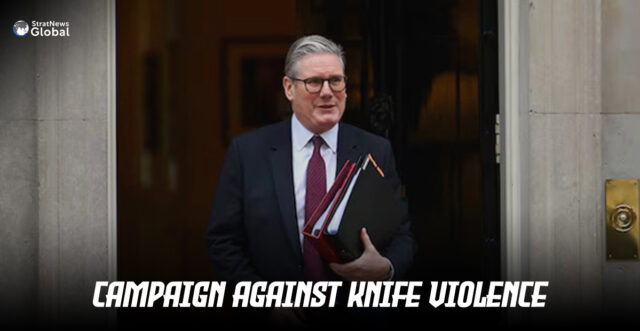One year after one of Britain’s most shocking knife attacks, the government has launched a month-long campaign urging the youth to surrender bladed weapons at designated “amnesty” bins or mobile collection vans—part of a broader effort to curb knife-related violence, especially among youth.
On July 29, 2024, teenager Axel Rudakubana, who was obsessed with violence and genocide, attacked a Taylor Swift-themed children’s dance event in the northern English town of Southport, killing three girls and stabbing 10 other people.
Since then, Prime Minister Keir Starmer’s Labour government has pledged tougher age checks for knife buyers, warned social media firms they could face fines for failing to curb sales and promotion of weapons, and banned zombie-style knives and ninja swords.
Starmer launched a coalition in September last year aimed at tackling youth knife crime. Actor and anti-knife campaigner Idris Elba joined the conversation at a meeting this month, alongside King Charles.
Charities and experts interviewed by Reuters call the government’s efforts a step forward but say they largely fail to address the root causes. Some charities involved in classes and workshops aimed at young people are urging the government to make such education part of the national curriculum.
Overall, knife crime in England and Wales has risen 87% over the past decade, with 54,587 offences last year alone, a 2% rise from 2023 and among the highest rates in Europe, figures from Britain’s interior ministry show.
It did not provide a breakdown of knife crime offences by age group. But data from the justice ministry showed that in the year to March 2024, there were just over 3,200 knife or offensive weapon offences committed by children (aged 10-17) resulting in a caution or sentence.
Of the 262 people killed with a knife or sharp object in the 12 months to March 2024, 57 were under 25. Kitchen knives were the most commonly used weapons.
A public inquiry into the Southport murders that opened this month will begin by looking into the specifics of Rudakubana’s case before a second phase examines the wider issue of children being drawn into violence, an increasing concern for British authorities.
Amanda Marlow, from the youth charity Safety Centre, which runs knife crime awareness workshops in schools, says young people carry knives for a range of reasons. These include seeing it as a “quick fix” to make money when growing up in poverty, trying to gain status among peers, or being drawn into the wrong crowd, such as gangs, where they are often exploited.
Some police forces have launched dedicated knife crime units. In the West Midlands, one of the country’s worst-hit areas, the Guardian Taskforce focuses on reducing knife crime among under-25s.
In June alone, officers patrolled for over 3,000 hours, carried out 366 stop-and-searches, and seized 57 knives or offensive weapons. “Every knife seized is a life saved,” Inspector Kate Jeffries of the task force said in a statement.
After surviving the Southport stabbings, Leanne Lucas launched the “Let’s Be Blunt” campaign, calling for safer, rounded-tip kitchen knives instead of pointed ones.
Poverty And Mental Health
Jade Levell, a researcher at the University of Bristol who studies masculinity, vulnerability and violence, said anti-knife crime efforts should focus on early intervention, such as mental health care, rather than short-term fixes like amnesty bins.
“Some boys see their only option is to be afraid or to make others afraid of them,” Levell said, referring to those growing up with violence, poverty or discrimination.
Some 4.5 million children are growing up in poverty in the UK, according to charities. In 2023, about 1 in 5 children and young people aged 8 to 25 years had a probable mental disorder, according to the National Health Service.
The government announced funding this month for hubs offering mental health and career support for young people at risk of gang involvement, violence or knife crime. The scheme, focused on high-risk areas, is starting with eight such centres and aims to have 50 open in the next four years.
Educating Young People
The violent death of his son two years ago prompted Martin Cosser to found a charity dedicated to educating young people about knife crime, one of several such initiatives around the country.
Charlie’s Promise, named after 17-year-old Charlie who was stabbed multiple times in the chest by another teenager at a packed end-of-term party, has spoken to 41,000 young people in schools and elsewhere.
“Nothing brings my little boy home,” said Cosser, adding that far more must be done to stop the knife crime crisis spiralling out of control. “We need to understand the emotional drivers behind why people pick up knives.”
Charity Safety Centre delivers workshops in schools, specifically designed for children aged 9 to 12. At a recent session in a school in the southern English town of Milton Keynes, staff from the charity explained what knife crime is and the dangers it poses, encouraging active participation through questions and games.
Safety Centre and Charlie’s Promise are among several groups calling for such education to become a mandatory part of the national school curriculum.
Amani Simpson, who survived being stabbed in 2011 and now shares his story as a youth coach, believes societal pressures and some forms of entertainment, such as violent video games, also play a role in spawning knife crime.
“Young people feel displaced and disengaged … those things need to be uprooted,” Simpson said after a talk at TCES North West London, a special education school, emphasising the importance of helping them believe in their own potential so they make better choices.
“Hope for me is the missing piece,” he said.
(With inputs from Reuters)





